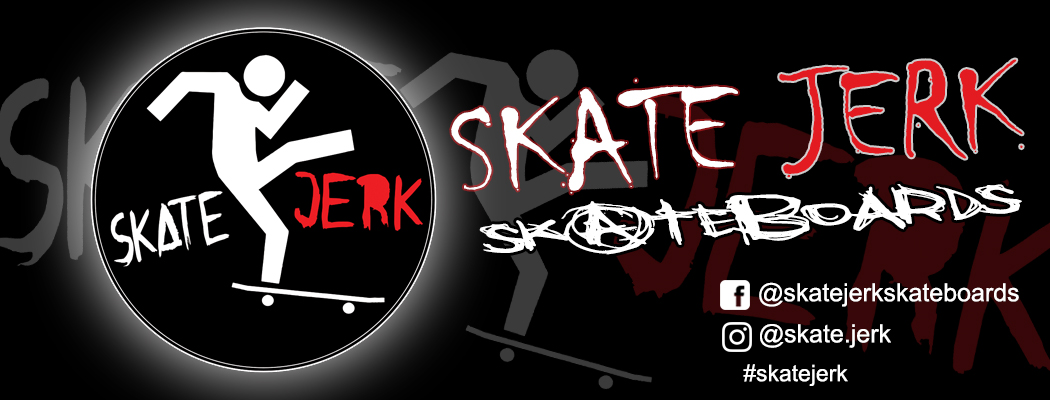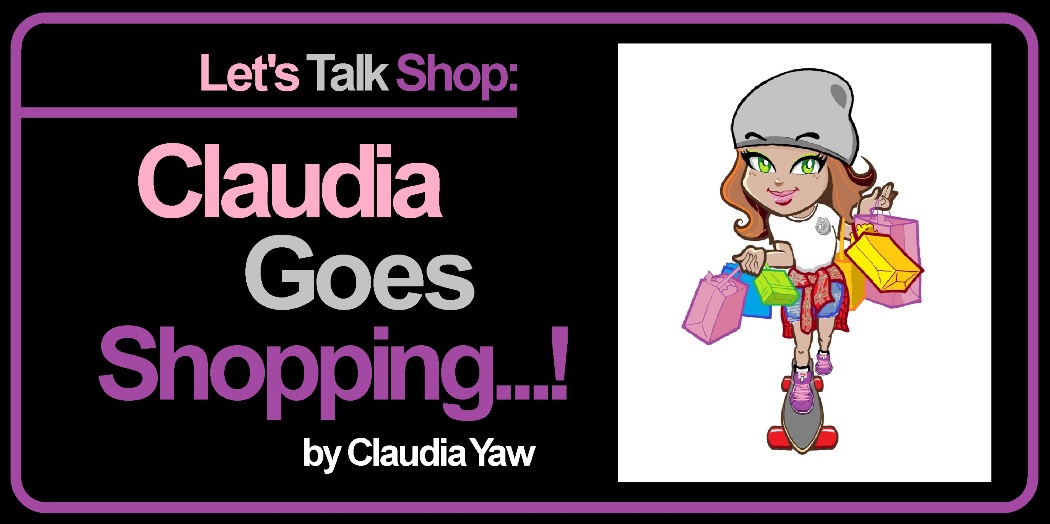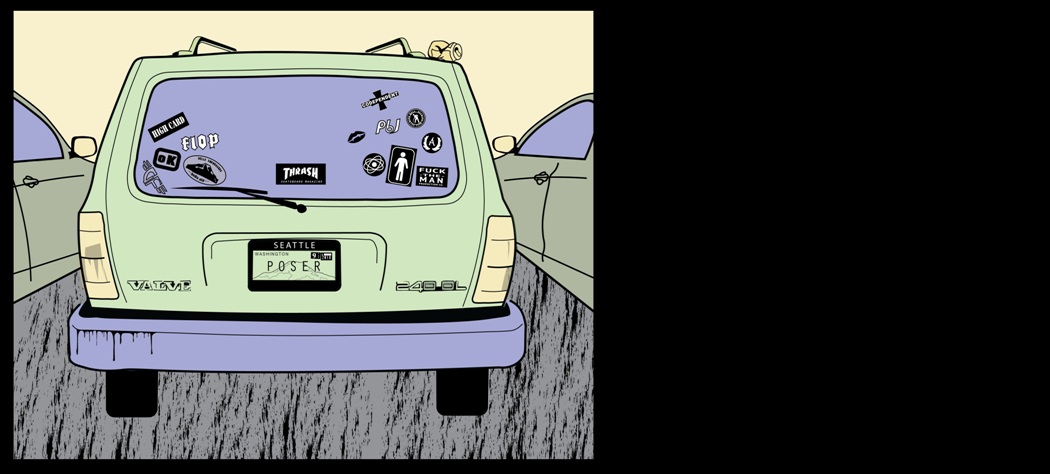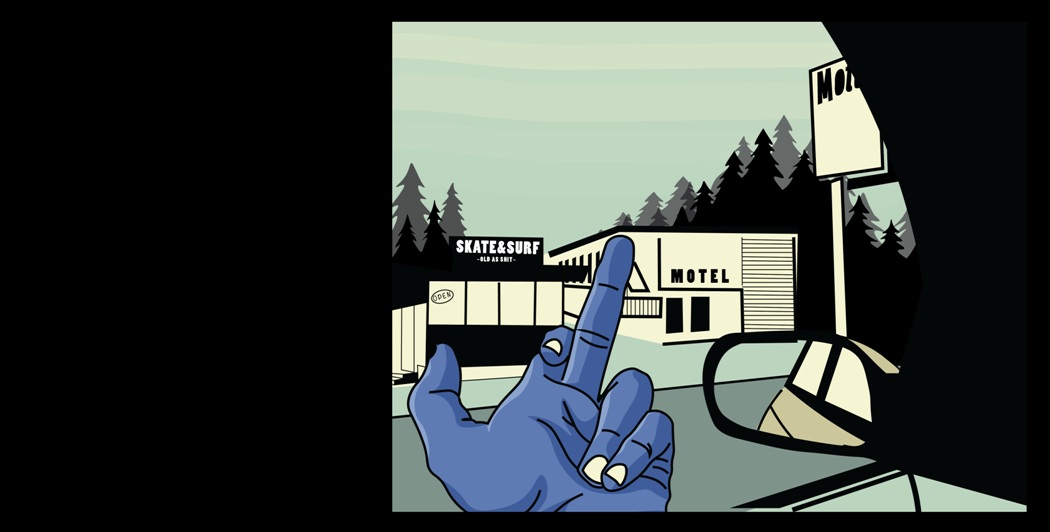


It was a typically sub-par Monday afternoon in Renton, the town I like to describe as ‘the armpit of Seattle.’ Renton is plagued with the same depressing gray skies as Seattle, and is close enough for residents to claim themselves as Seattleites, only instead of cool museums or outdoor markets to distract us from the soggy weather, we have motels and Jimi Hendrix’s dead body. In scoping out the “Seattle skate scene,” I hoped to gather some material for my first article in Everything Skateboarding, and headed to my local shop, which had been around since the dawn of skateboarding.
Now, I’ll be the first to admit that I’m a poser. A poser in the world of journalism, a poser in the world of skateboarding… so much of a poser, I’m not even sure I’m a real human being. So, walking into what is supposed to be a pretty rad skate shop, and asking questions like some sort of fun-sized investigator, I wouldn’t be upset if any old school skaters in the shop didn’t take me seriously. I was ready to take what I could get, and put aside any pride I had. Despite this mindset, things quickly took a turn for the worse.
Being a resident of Renton myself, I was in no way deterred by the crumbling motel lot I had to park in, or the store’s walkway, which was littered with tools and discarded wood. Such things were expected in this city, especially considering the age of the shop. In front of a poster for Creature Skateboards, I noticed a neon “open” sign hanging in the window as I approached the glass door. Before my entrance, however, it was established that this small business was not welcoming visitors at this time. A 30-some year old man stood in the shop, his shoulder against the door. As I began to push it open, he didn’t budge. With the door open a few inches, pressed against the dude’s shoulder, I hesitated, struck by the bizarre nature of the situation. Still clutching the doorknob, I made uncomfortable eye contact with the man behind the counter, who clearly saw that I, a customer, was attempting to enter his establishment. Perhaps the fact that the inhabitants of this vicinity were literally using physical force to keep me out should have been a clue that my first adventure in journalism wasn’t going to go well. But I had a few shots of espresso in me, and, bright eyed and optimistic, I proceeded to push my way in and introduce myself, disregarding the tension in the air, which mingled with the tropical vape that assaulted my senses.
The man behind the counter not only seemed uninterested, but abrasive. Only after extensive online sleuthing later on did I learn the man’s name (which I’ll change to Mitch), and that he had been working here for several years, most of which were spent rocking a much longer and shaggier hairstyle. Apparently he was not the owner, but “probably who [I] wanted to talk to,” whatever that meant. Great, I thought, I found my guy. Too bad Mitch had “no commentary on skating, or the skate scene, or whatever…” No insight, nothing to say. Looking to the side of the counter, the self-proclaimed bouncer of the store was still loitering, now smoking a joint. He had eyeblack tattooed onto his cheekbones, as well as a sloppy neck tat of the blue handicap symbol. I later wondered whether the tattoo symbolized his own handicap or the handicap he gave to those who crossed him. Mitch aggressively requested that I take no photos of him, noticing the camera hung around my neck, and record no audio either. It was at this point that it occured to me that Mr. Neck Tat perhaps was neither an employee or a customer. And that maybe I had walked into the middle of some nasty business.
Although I have witnessed many a sketchy drug deal during my time in Seattle, the close proximity of this one, as well as the amount of face and neck tattoos involved, made this particular situation seem like I should probably exit. I’m also a small not-at-all-intimidating teenage girl. But lo and behold, Sketchy Dude #3 made an appearance! Entering from a back room I hadn’t noticed, Sketchy Dude #3, hereinafter referred to as to as Sketchy Dude #3, was apparently the only one in the building who had any interest in answering my (mind you, pretty simple) questions. “Scenes?!” he shouted. “Scenes are dead! Scene culture used to be a thing, but not anymore.” At this point I said fuck it, I might as well get something out of this trip so it’s not a complete bust. Sketchy Dude #3, with this creative facial hair and patched hoodie, laid out his disappointment with “all scenes,” blaming new technology and younger kids for “turning everything to blah.” After pressing the 40ish year-old for something more specific than “scenes are dead,” and “people used to fuck some real shit up,” it became clear that his thoughts were just as pessimistic as they were fucked up by whatever he was on. From what I could make out of the slurred, arm-waving gibberish, Sketchy Dude #3 believed that the skate scene across the nation was on the decline. I had obviously heard this rhetoric before–mainly from middle aged men like him. And his resentment towards the new scene seemed to register with Mitch and Neck Tat, who were nodding and muttering in the corner. I guess they, too, were angry with how skating has progressed, or not progressed, in the Pacific Northwest.
I left the shop furious that nobody had even listened to my questions, let alone provided me with insight into the Seattle skate scene or how it has evolved. This place was supposed to be cool! Vintage decks lined their ceiling and ‘70s era ads and band posters hung above an old wood fireplace. But instead of meeting people of equal charm or character, I was rudely shut down and denied the basic courtesy and service that I would expect from any decent shop. I was pissed. But as I left the shop, I passed by Mitch’s car, littered with old skate stickers, a crushed PBR can teetering on the roof. It was a final visual of the sad shop that I had invested too much faith in. As upset as I was, perhaps I was naive to expect award-winning customer service at such an old-school shop. These original shops often cater towards an older crowd, who surely exist in a realm of skateboarding that is much different than how it is now.

While old-school skaters used to trespass into empty pools, tear it up, and carry an often anarcheal message of ‘fuck the man,’ younger skaters are growing up in a generation where the sport is being used to further more refined, even political, purposes. Skateboarding has become vastly more diverse, and skating organizations pushing everything from autism awareness, Native representation, and women’s empowerment, continue to succeed in the industry. Hell, “Skate Like a Girl” was founded here in Seattle! But this inclusion has not always existed in skateboarding, and it makes sense that the older generation of skating feels as though their scene has moved away from its original roots.
The conflict between local old-school shops and upscale, more consumer-based skate shops is therefore both a cause and effect of the generational gap that exists in skateboarding. I often agree with the complaints against the gentrification of local shops–I hate capitalist mass-produced bullshit just as much as the next guy. However, while these mainstream mall-shops (cough*Zumiez*cough) steal business from your local store, at least they’re actually encouraging more kids to skate. Ironically, I had actually visited a Zumiez that same day–I popped in for a Christmas gift, and was immediately met with smiling faces. When he was done helping some 8 year old pick out his first skateboard, a guy about my age asked if I had any questions or if I wanted to check out any boards. Call them kiss-ups or douchebags, but at least these chains aren’t too caught up with how underground, longstanding, or badass they are to treat their customers right and actually help them become better skaters. Local shops are being overrun because chains don’t care if posers like me walk in–they’re not going to scoff at mini-van-driving moms buying a board for their kids, or nerdy-looking high schoolers trying to skate for the first time. And they’re DEFINITELY not going to let clients walk in on their drug deals (pretty sure Zumiez employees are trained to buy their drugs in the food court).
The uninviting atmosphere festering in the Renton shop was not only off-putting, but incredibly self-indulgent. Being “too cool for school” is one thing, but being too cool for customers is quite another. Why do you even have an “open” sign if you’re just going to sit around smoking weed and being an asshole to kids? No wonder malls are kicking your ass–you have the worst business model ever.

At the end of the day, though, this attitude is just bad for skating. Mitch, Neck Tat, and Sketchy Dude #3 work at a shop which has a sole purpose of facilitating the success of other skaters, and if they actually loved skating, they would be passionate about encouraging people, even the most cringe-worthy of amateurs, to be better skaters. And if they’re not, then maybe they’re the bigger posers. I’m most definitely biased, but I think my generation understands the importance of this openness and inclusivity. The scene, especially in Seattle, skates on, even if these old geezers aren’t on board.

